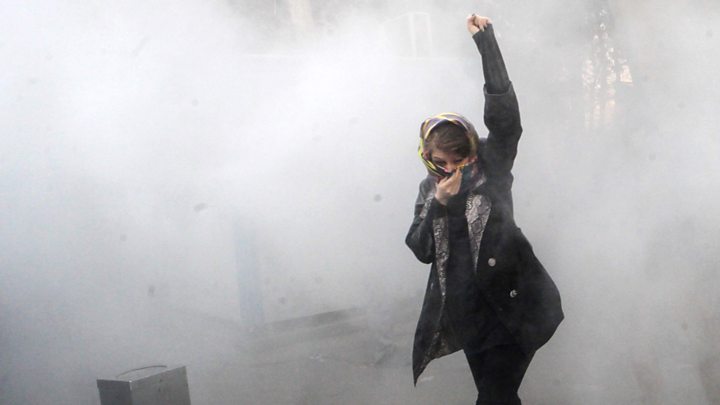Iran protests: US brands Tehran's accusations 'nonsense'
The US has branded as "complete nonsense" Iran's accusation that its enemies have been behind a wave of violent protests sweeping the country.
Iran's supreme leader Ayatollah Ali Khamenei had made the accusation in his first comments on the protests.
US envoy to the UN Nikki Haley said the protests were "spontaneous", adding that the US planned to call an emergency UN meeting on the situation.
The unrest began last Thursday and has seen 22 people killed.
The demonstrations, which started in the city of Mashhad, were initially against price rises and corruption, but then began to express wider anti-government sentiment.
- Why are there protests in Iran?
- An unpredictable challenge for Iran
- Iran voices: 'We have the right to protest'
Meanwhile, Iranian President Hassan Rouhani spoke with French counterpart Emmanuel Macron on Tuesday. Mr Macron called for "restraint" and it was decided that a visit by France's foreign minister due this week should be postponed,
What's behind the latest US-Iran clash?
In a post on his official website, Iran's supreme leader had said: "In recent days, enemies of Iran used different tools including cash, weapons, politics and intelligence services to create troubles for the Islamic Republic."
Analysts say the ayatollah's reference to "enemies" is a swipe at Israel, the US and regional rival Saudi Arabia.
Skip Twitter post by @khamenei_ir
The dignity, security, and progress of the Iranian nation is owed to the self-sacrifice of the martyrs. What prevents enemies from exerting their atrocities is the spirit of courage, sacrifice, and faith within the nation.
— Khamenei.ir (@khamenei_ir) January 2, 2018
Report
End of Twitter post by @khamenei_ir
Ms Haley said the accusation was "ridiculous".
She added: "The people of Iran are crying out for freedom, All freedom-loving people must stand with their cause."
She said the US would call for an emergency meeting of the UN Security Council to discuss the anti-government protests.
 Media playback is unsupported on your device
Media playback is unsupported on your deviceThe BBC's Nada Tawfik in New York says the Security Council deals with international threats to peace and security and it is unclear if there would be enough support among council members for such a meeting.
Ms Haley continued: "The freedoms that are enshrined in the United Nations charter are under attack in Iran. Dozens have already been killed. Hundreds have been arrested.
"If the Iranian dictatorship's history is any guide, we can expect more outrageous abuses in the days to come."
- Iran's Revolutionary Guards take lead on foreign affairs
- US warns Iran: The world is watching
- Who is Hassan Rouhani?
The US stance to the unrest, which has included a string of tweets from President Donald Trump, has drawn an angry response from the Iranian leadership.
Iran's foreign ministry spokesman, Bahram Ghasemi, said Mr Trump should focus on "the domestic issues of his own country, such as daily killings of dozens of people… and the existence of millions of homeless and hungry people".
Even a group of reformist and moderate MPs accused the US of trying to take advantage of the situation.
Where is the violence happening?
There were reports on social media late on Tuesday of more unrest, although it is not possible to confirm it independently or the exact timing. The reports spoke of:
- Burning buildings in the town of Behbahan
- Protests spreading to the north-western city of Tabriz
- Police firing tear gas to break up protests in the south-western city of Ahvaz
- Unrest in Gohardasht and Eslamabad-e-Gharb
Unconfirmed video footage on social media showed protesters and security forces on the streets of the city of Hamedan; flash bombs or grenades being thrown in Rasht and street fires in Karaj.
More than 450 arrests have been made in Tehran alone over the past three days.
Where will the protests lead?
By Jeremy Bowen, BBC Middle East editor
When the protests started last Thursday, they were about the current economic crisis but as they spread, pent-up frustrations spilled out and politics became a big part of them.
President Rouhani has been widely criticised. He has disappointed voters who hoped he would do more to turn round an economy that has been damaged by years of sanctions, corruption and mismanagement.
Iran's role in conflicts across the Middle East has also been criticised as it is an expensive foreign policy at a time when people in Iran are getting poorer.
Leading figures in the Islamic Republic have also been targeted by protesters, including Supreme Leader Ayatollah Khamenei. He has responded by blaming foreigners. Iran has suffered in the past from foreign interference, so his words will strike a chord among some – and could also signal a much tougher response from the security forces.
The demonstrations do not seem to have recognisable leaders, unlike the last big protests after the disputed presidential election in 2009. At that time, the elite of the Islamic Republic was divided. It is not at the moment, so that will make it harder for the protests to be sustained, and they may run out of steam.
But the fact they are happening at all is very significant. They show how discontented Iranians are with increasing poverty, after years of repression.
Have we seen such protests before?
They are the largest since the disputed 2009 presidential election.
Mass demonstrations then – referred to as the Green Movement – were held by millions of opposition supporters against the victory of incumbent President Mahmoud Ahmadinejad.
At least 30 people were killed and thousands arrested in the wave of protests, which drew the largest crowds in Iran since the Islamic Revolution of 1979.

